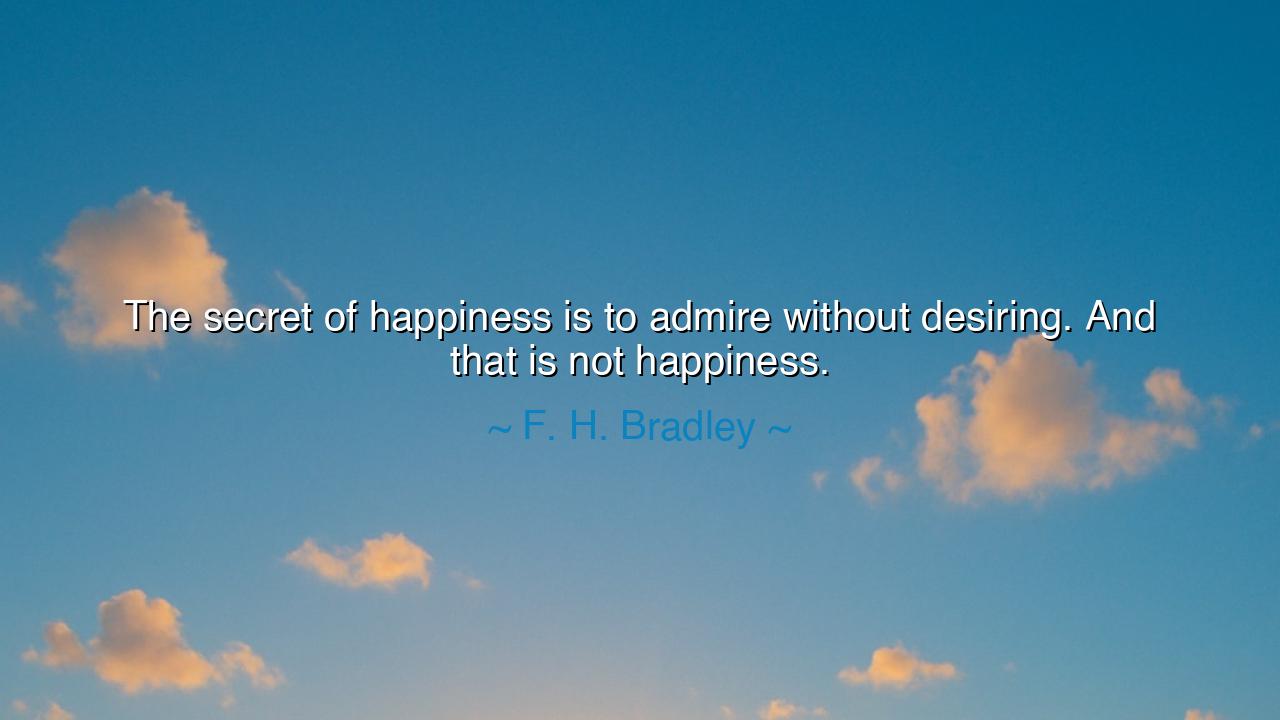
The secret of happiness is to admire without desiring. And that






The words of F. H. Bradley — “The secret of happiness is to admire without desiring. And that is not happiness.” — shimmer with paradox, as all great truths do. In these lines, the philosopher reveals both a key and a warning: that the human heart, in its yearning, often confuses admiration with possession, and contentment with desire. To admire without desiring is, he says, the highest wisdom — for admiration alone is pure, free from the fever of wanting. Yet he adds, in his quiet irony, that even this state is not true happiness, for happiness itself forever eludes definition. It is the flame we chase, never quite able to hold, for the moment we reach for it, we disturb its stillness.
Francis Herbert Bradley, the British idealist philosopher of the 19th century, belonged to an age of great intellectual questioning. He sought to understand the nature of reality, truth, and morality — and through that seeking, he came to see that the human mind lives in contradiction. We desire peace, yet we are restless; we crave meaning, yet resist surrender. In this quote, Bradley captures the tension at the core of human nature: that happiness, in its purest sense, cannot coexist with craving. To “admire without desiring” means to look upon beauty, greatness, or goodness and allow it to exist without the need to claim it — to let it be, to honor it in stillness. And yet, he acknowledges with a philosopher’s melancholy, that such calm detachment, though serene, is not the warm pulse of happiness but something colder, quieter — the peace of the mountain rather than the song of the heart.
To admire is the act of reverence. It is the soul’s recognition of something noble, beautiful, or divine beyond itself. It lifts us upward; it humbles us; it fills us with awe. But when admiration turns to desire, the spirit trembles and reaches, seeking to own what was never meant to be possessed. The flower admired brings joy; the flower plucked fades and dies. Bradley’s wisdom lies here: that to love the world without grasping at it, to let beauty live in its own freedom, is to be close to peace. Yet his sorrow lies also here: that peace so detached may lack the very passion that makes us feel alive.
Consider the story of Prince Siddhartha, who would become the Buddha. Born amid luxury and surrounded by beauty, he admired the splendor of his palace and the tenderness of his family. But the moment he desired that life to remain untouched by sorrow, the illusion shattered. When he saw sickness, age, and death, he learned that desire — even for good things — binds the soul to suffering. He left all he loved behind and sought a higher truth. In the forest, he learned to admire without desiring — to behold life without clinging to it, to love without attachment. And in that letting go, he found something greater than happiness: enlightenment, the still flame of wisdom that neither craves nor despairs.
Bradley’s reflection belongs to this lineage of insight. He does not reject happiness; rather, he unmasks its fleeting nature. For the one who admires without desiring has overcome the turbulence of want — yet has also stepped beyond the warmth of joy. It is the paradox of the sage who stands at the mountain’s summit: he






AAdministratorAdministrator
Welcome, honored guests. Please leave a comment, we will respond soon